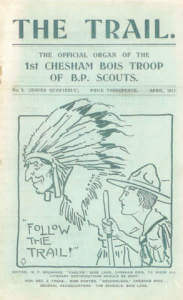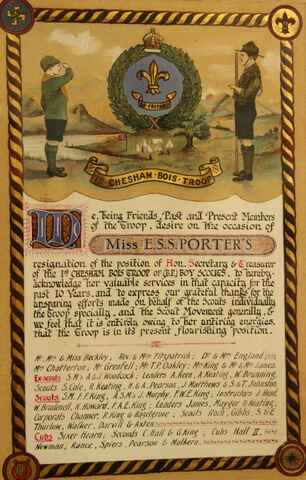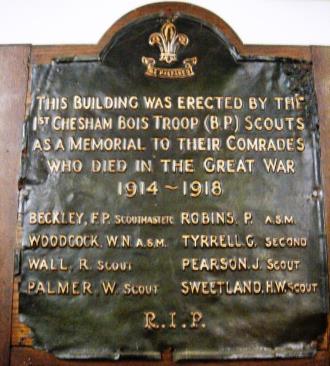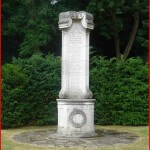Updated by Alison Bailey November 2023
When an elderly spinster died in 1940 after falling down the stairs at her home in Bois Lane, she was not just mourned by her family, but by her whole community. “A woman of strong individuality, decided opinions and some determination”, she was best remembered for her support of the 1st Chesham Bois Scouts during WW1.
An article in the Bucks Herald of 29th March 1940 under the headlines “Lady’s Accidental Death”, “Loss to Chesham Bois” describing her has follows: “In her day Miss Porter was very active in the life of Chesham Bois and indeed of a much wider area. She was a talented musician and one with a flair for the dramatic art as well, a keen business woman, vitally interested in the young folk around her, and willing to help them in all sorts of ways – she was an invaluable citizen and behind many good works. The Boy Scouts found her a strong sympathiser and supporter; her interest in the dramatics and the musical side of the drama and in opera made her a very fine coach, and there are plenty about who can bear witness to the act that she was patient and resourceful in coaching; and being conversant with music in many phases, in theory and execution. She used her knowledge to teach others.” This is her story:
Elizabeth Sudworth Stansfeld Porter 1866 -1940
Elizabeth was born in Warrington, the eldest child of Reverend James Nixon Porter and his wife Ellen, the daughter of Judge James Stansfeld. Elizabeth’s uncle was the social reformer, Sir James Stansfeld, Liberal MP for Halifax, who served as a government minister under Lord Russell and William Gladstone. Her family was comfortably off, Unitarian and liberal which meant that, like her younger brothers, she received a good education. A talented musician, she later shared her gifts as a kind and patient teacher, performer, and accompanist.
Tragedy struck the family when her father died at the age of 59 after a railway accident. Elizabeth was 9 and her youngest brother just 4. She was 24 when her mother died, and in 1909, age 43, she moved to Meadowlead, a cottage opposite Chesham Bois Common. Her reasons for moving to the area are unknown. Her brother William did not marry and was working as a teacher in Bermuda. Her youngest brother, Ralph, was a lecturer in engineering at Birmingham University where he lived with his wife and three sons.
Miss Porter, as she was known, soon threw herself into village life. She taught music and joined various committees, raising funds for the Chesham Cottage Hospital and other worthy causes. From 1910 she volunteered as secretary and treasurer of the 1st Chesham Bois Scouts, which had been founded just two earlier, making it one Robert Baden-Powell’s first troops.
World War I
During WW1, with the scout master (her good friend, Frederick Beckley) away on active service, she ensured the troop kept going and actively contributed to the war effort. Using half the weekly subscription money, and funds raised through musical entertainments, she sent letters and parcels to every scout on active service, earning the Troop’s’ everlasting gratitude.
“I send out parcels to all the old Scouts I have been able to keep in touch with; those serving abroad get them more frequently than those on home service; we send to those in England if we know that the food they are getting is a bit short or not very appetising, and everyone is remembered at Christmas. Only five or six parcels have failed to reach their destination since the very beginning of the war; of these, two have been returned, none the worse for their travels”.
A typical parcel contained the following: 1 air pillow, 1 pair of hand-knitted woollen socks, 2 khaki pocket handkerchiefs, 1 writing pad, Vaseline, chocolate, cocoa and milk tablets, sardines, candles and soap squares.

The Trail

In 1917 Miss Porter started a newsletter, The Trail, which she included in every parcel. In return the scouts wrote back to thank Miss Porter and gave details in their letters of the problems of everyday living in the trenches and having to deal with “King Mud”. “Just a line in answer to your letter and “The Trail”, and to thank you so much for the parcel which I received just before I came up the line. I am in the trenches now, and this is my first time in, so it is rather exciting at times. We have had one wet day, and I don’t want another, as we get smothered in mud from head to foot, and we have to let our clothes dry on us, and scrape the mud off with a knife; but as it happened those cocoa tablets which you sent came in very handy, as we made some nice hot cocoa, and that kept the cold out of us while the rain was on; but I am glad to say none of us caught cold.”
Other letters published in the Trail include accounts of the “rigours of training”: “Some of our marches are proper teasers. The company officers (who ride on horseback) think exercise is good for us; so they take us across all the ploughed fields they can find, give us half a day at trench digging, and then expect us to turn up quite fresh ten miles from home.”
Letters include descriptions of the drudgery of being a soldier and show their “light-hearted courage”; “Each man carries his own food, blanket, and cooking utensils, besides his fighting equipment. For the first few miles everything is quite all right, and it’s quite easy to whistle, keep step, and in fact behave in the cheery manner usually associated (by armchair critics) with the British Tommy. But after the first halt or two things begin to get a bit different; feet are getting sore, shoulders begin to ache, and equipment begins to chafe. The roads here are of course against marching, it’s not uncommon sight to see otherwise strong hearty men limping along and almost crying with fatigue and the agony of chafed feet. It seems sometimes as if you’ve reached the limit of human endurance. Chaps are staggering along half blinded by perspiration, and expressing very forcibly their opinion of the mud, roads, country, and in fact the war in general. And yet these same fellows, on hearing that the C.O. or perhaps another battalion is coming past, can shuffle into step, hold their heads up, throw their chests out, and rake up a chorus, as though they were just out on a pleasure jaunt”.
Some letters convey the real excitement of new experiences, such as a first flight in an aeroplane; “We’d only got a few feet up when the pilot started his capers. Instead of going up gradually, he pulled his ‘joy stick’ back and shot upwards at an angle of about sixty degrees; and when we seemed to be dropping backwards, he pushed his joy stick forward again and went into a nose dive, the two manoeuvres resembling a huge switchback. During ‘stunts’ of this kind, it makes you feel as though you’re in a small boat on a choppy sea (only worse). After this we climbed to about four thousand feet, and for the first time I had the chance to look round me. Our sheds looked like matchboxes, the mechanics like little specks, and the surrounding country like a coloured map. We rose still higher until we were about seven thousand feet, and now and again we floated into thin mists, which of course were clouds. While we were going through the clouds I was glad I’d got some thick clothing; as it was much colder and also very damp.”
Another letter talks of taking part in a daylight bombing raid and being attacked by enemy fire; “Pop-pop r-r-r-r-r-r-r-r-r. Suddenly, and surprisingly, if you are not on the alert, the monotonous and continuous noise of the engine is broken by the fire of a machine gun. It may only be another Observer testing his gun; but even so he has succeeded in giving you a shaking up, and afterward you are busy in all directions staring over the side to look below the machine for any “Huns” lurking there. If you are lucky you may be able to get away from the “Hun” before he has attained your height. Usually, how-ever, you sure to run up against him, and until his petrol runs out, or until you re-cross the ‘lines,’ you have a very busy time keeping him off.”
Record of Troop’s Service
After the War Miss Porter wrote a detailed account of the Troop’s War Service in The Trail and a very modest account of her own contribution: “It was a very dull morning for me when there was not at least one envelope thrust into the letter-box. From all over the world they came – from France, Belgium, Germany, Egypt, Salonica, Gallipoli, Palestine, India, England, Scotland, Ireland and Wales. None of your half-sheets; good long “talking” letters, written under all sorts of conditions-in the trenches, under shell-fire, guarding search lights, waiting for air-raids, at sea, in huts, tents, billets, or Y.M.C.A canteens.
Strange to say, the bigger and weightier the writer, the lighter and more fairy-like was his handling of the pencil; I used to write and say, “Would you mind putting more weight on it? You write so faintly, no one would guess you were five feet eleven in your socks.”
In nearly every letter was an enquiry after “the old Troop,” and hearty wishes for its welfare and progress. The writer might be in the midst of battle, murder, and sudden death, but was never too pre-occupied to send words of encouragement and advice about worries and difficulties at home- oh, so small by comparison, but harassing, all the same. I got a lot of cheering up from the trenches. And when there was absolutely no time for a letter, I got a field postcard with everything crossed out but “I am quite well”- which, being interpreted, meant “Been in a bit of a scrap; came out all right.” Once I had a field postcard with nothing crossed out at all, and not even signed; but I knew the handwriting of the address, and gave thanks accordingly.

I hope the Troop knows how much the parcels were appreciated, towards which they allotted one half of their weekly Troop subscriptions. But I had all the fun of it- shopping, choosing the presents, packing them up, and receiving official compliments over the counter on the well-secured box and legible address. I know someone who thinks it’s wrong to pay compliments; perhaps; but it’s delightful to receive them, anyhow. Even the Armistice did not cure me of the parcel-foraging habit; I never went into a shop without a roving eye for a possible item; many a slab of chocolate has been brought out from under the counter in places where they were “out of it Madam,” until they knew it was for a soldier.
We are proud of our scouts who served- 39 in all, as far as I can trace them. We can boast of seven commissions and four sergeants; one was mentioned in despatches and another was awarded the Air Force Medal. But these fellows would be the first to remind you that there are many equally deserving, though honours and promotion did not happen to come their way. I can only repeat we are proud of all our old boys. Out of our 39 serving, we have lost 8; we don’t forget them; we remember their ways, their talk, their doings, and we often speak of them. Our Scoutmaster, F. P. Beckley is one of them; in the words of his platoon commander “he endeared himself to us all”; and the number also includes two of our Assistant Scoutmasters, P. Robins and C. Woodcock- both splendid fellows. The case of Scout W. Palmer is especially sad; he was taken prisoner early in the war, and died in Germany a few days before the Armistice. Almost the last communication received from him was a card of thanks for a Scout parcel.”
Retirement

It is obvious that Miss Porter’s own contribution to the war effort was incredible. Her thrift, enterprise (selling advertising space in the Trail for example), generosity in donating prizes and using her musical talents in concerts, all raised valuable funds. This kept the Troop going with so many away and enabled her to provide tremendous support to those scouts on active service. Her home, Meadowlead was always an open door and a meeting place for scouts on leave from the war. She was evidently dearly loved and valued. The Trail of April 1919 declares “At our last Troop Committee Meeting, held at Meadowlead, Miss Porter, as our supporters will be shocked to hear, actually decided to give up the position of Secretary and Treasurer to the Troop. Of course we turned up to the meeting with strong reinforcements, and Mr. Beckley, and persuaded her to stay on until some of the old Scouts come home. It is horrible to think of the Troop without Miss Porter, and as long as she is able, she shall be our ‘Hon. Secretary and Treasurer.” When she eventually retired the Troop presented her with a rosewood music cabinet and an illuminated address, honouring her outstanding duty to the 1st Chesham Bois Scouts.

In addition to being the secretary of the Chesham Bois War Memorial Committee and representing the Troop at the dedication service of J.H. Kennard’s Memorial 11th November 1920, Miss Porter’s final contribution to the war effort was to organise the subscription to fund the Troop’s own bronze memorial to the 8 fallen scouts. This is still located in the Pioneer Hall today after it survived the 1932 fire which burnt down the original hall.
Chesham Bois Scouts WWI ROLL OF HONOUR
This roll of honour, listing all those Scouts who had been in the Armed Forces in WWI, appeared in the October 1919 edition of “The Trail” and included this tribute from Miss Porter:
“We are proud of our Scouts who served – 39 in all, as far as I can trace them. We can boast of seven commissions and four sergeants; one was mentioned in despatches and another was awarded the Air Force Medal. But these fellows would be the first to remind you that there are many equally deserving, though honours and promotion did not happen to come their way. I can only repeat we are proud of all our old boys. Out of our 39 serving, we have lost 8; we don’t forget them; we remember their ways, their talk, their doings, and we often speak of them. Our Scoutmaster, F. P. Beckley is one of them; in the words of his platoon commander “he endeared himself to us all”; and the number also includes two of our Assistant Scoutmasters, P. Robins and C. Woodcock – both splendid fellows. The case of Scout W. Palmer is specially sad: he was taken prisoner early in the war, and died in Germany a few days before the Armistice. Almost the last communication received from him was a card of thanks for a Scout parcel.”
Scoutmaster F. P. Beckley. Oxon and Bucks Territorials. Joined the Forces Aug 1914, Oxon and Bucks L.I. Made Cpl., then Sergt. Went to France early in 1915. Wounded Apr. 23rd., died of wounds Apr. 24th. 1915, aged 23. Buried at Ploegsteerte, Belgium.
Scout R Wall. Bugler, Suffolk Regt. Transferred to 14th Highland L. I. Killed in France July 29th, 1916.
Scout J. Pearson. Sapper, R.E. Helped to extinguish a fire in a burning building when quartered at Chatham. Died in France of injuries resulting from an accident, Nov. 30th, 1916.
Cpl. G. Tyrretll. 101st Canadian lnfantry. Transferred to 16th Canadian Scottish. Died of wounds in France April 20th, 1917.
Asst. Scoutmaster P. Robins. 4th R. Fusiliers. Made Cpl. Instructor, then Sergt. Killed in France, May 13th, 1917.
Asst Scoutmaster C W. N. Woodcock. H.A.C. Served in France. 2nd Lieut. 10th R. Fusiliers, 1918. Killed in France Sept. 14th. 1918, aged 27.
Scout W. Palmer. Rife Bgde. Served in France. Prisoner of War. Died in Germany from influenza, Nov. 1918.
Scout H. W, Sweetland. Driver. A.S.C. Killed in France.
Asst. Scoutmaster H. G. Ralne. Canadian Field Artillery.
Asst. Scoutmaster R. Corin. Indian Officers’ Reserve.
Acting Scoutmaster A. P Sewell. Indian Medical Service. Then 2nd Lieut., R.G.A.
Scoutmaster A. N. Woodcock. H.A.C. Served in France. 2nd Lieut. 17th R. Fusiliers, 1918. Then 6th Light Trench Mortar Battery. Demobilised April, 1919.
Leader W. J. E. Ross. Artists’ Rifles. Then 2nd Lieut., 1st Wilts. Regt., Oct. 1915. Served in France. Mentioned in Despatches, April 6th, 1917. 1st Lieut. Nov. 1917. Wounded several times. Demobilised Aug., 1919.
Scoutmaster J. J. N. Woodcock. 12th C. of London Rangers. Discharged on grounds of health, March 1915. Rejoined as 3rd Air Mec., R.F.C., Feb. 1917. Then Cadet, O.T.B. Then 2nd Lieut., Tank Corps. March, 1918. Demobilised Jan., 1919.
Leader A. A. Keen. L. Electrical Engineers, R.E. L.-Cpl. July. 1916. And 2nd Cpl. Oct., 1916. Cpl. April, 1918. Staff Sergt-Mech. April, 1919.
Scout R. Keating. Oxon and Bucks L.I. Wounded in France, July, 1916. Discharged on account of wounds, 1918.
Scout G. Martin. Beds. Regt. Then transferred to Essex Regt. Went to Egypt; guarded Canal. Then Palestine. Invalided to Egypt; rejoined Regt. in Palestine 1918. Demobilised April, 1919.
Leader F. Turvey. Gunner. R.F.A. Served in France. Invalided home (gas), 1918. Returned to France Nov. 1918. Demobilised March, 1919.
Leader F. Gates. Driver R.F.A. Served in France. Demobilised May, 1919.
Scout A. Merridan. Rifle Brigade. Served in France. Taken prisoner August, 1918. Returned home December, 1918.
Scout G. Matthews. Cyclist, R. Sussex Regt.
Scout H. Pearson. Driver R.F.A. Served in Salonica Field Force. Demobilised May, 1919.
Scout F. Morten. 2nd Air Mec. R.N.A.S. Then Air Mec., R.A.F. Served on H.M.S. Lion and witnessed surrender of the German Fleet. Demobilised April, 1919.
Scout A. Bignall. 3rd Beds. Regt
Leader A. Crowhurst. County of London Rangers.
Scout T. Dickison. R.E.
Scout E. Cheney. Army Vet. Corps.
Scout S. Cole. R.F.C. Then Sergt. Pilot, R.A.F. Served in France. Awarded A.F.M. Jan., 1919.
Scout A. Pearson. 92nd T.R. Batt. Then Duke of Cornwall’s L.I. Then 1st Wilts. Regt. Served In France. Taken prisoner April 10th, 1918. Returned home December, 1918.
Scout F.Upton. 95th T.R Batt. Then 5th Res. Regt. R. Warwicks Regt. Served in France. Invalided home July, 1918. Demobilised February, 1919.
Scout A. WIIkinson. R. Marine L.I. Served in France. Wounded Sept. 1918. Demobilised May 1919.
Leader W. C. Brudenell. Cadet R. Flying Corps; then 2nd Lieut. Observer R.A.F. Served in France.
Leader J. Head. Artists’ rifles. Discharged (grounds of health) May, 1919.
Leader A. E. Keating. R. Marine Engineers. Served in France. Demobilised February, 1919.
Scout E. J. Simpklns. 4th Devons. Regt., then R.A.M.C. with British Army on the Rhine.
Scout J. Matthews. 4th Devons. Regt., then R.A.M.C. with British Army on the Rhine.
Scout A. Matthews. A.S.C. (Roads)
Asst. Scoutmaster J. Murphy. Apprentice, Merchant Service.
Scout T. Kellar. Hants. Regt. Demobilised July, 1919.
